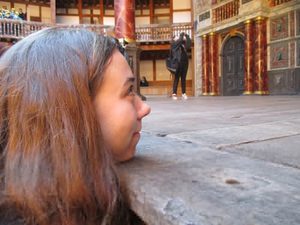 Congratulations to the five English majors who were awarded distinction for their independent study this year: Sam Chao ’16, Ellen Currier ’15, Grace Fremont ’15, Sarah Meister ’16, and Sarah Olson ’15. They created a commonplace book during Spring Term of 2014 under the direction of Prof. Pierre Hecker.
Congratulations to the five English majors who were awarded distinction for their independent study this year: Sam Chao ’16, Ellen Currier ’15, Grace Fremont ’15, Sarah Meister ’16, and Sarah Olson ’15. They created a commonplace book during Spring Term of 2014 under the direction of Prof. Pierre Hecker.
Commonplace books were a popular form of information sharing in the 15th and 16th centuries. People carried these blank journals around with them in their daily lives in order to record interesting quotes, draw pictures, remember recipes, keep track of finances, etc. Friends would flip through each other’s commonplace books and copy material into their own. The commonplace book had endless uses, similar to a blog or social network in contemporary culture. The modern commonplace book created for this independent study drew from students’ research and experiences on the Winter 2014 English and Theater Program in London.
In April of 2015, the five independent study participants submitted their work to the ACM Student Symposium on Off-Campus Study. It was accepted, and Sarah Meister presented the group’s project at the Chicago conference. The Miscellany interviewed Sarah about her experience at the conference.
Miscellany: First, could you please describe the research/creative process that the group followed during the independent study itself?
Sarah: We started our research by looking at some actual commonplace books. Before heading off to London, we visited Carleton’s special collections to look at some facsimiles of commonplace books and miscellanies, and heard some excellent presentations by students on the program. We got the chance to see some real commonplace books and miscellanies in London, at the University College London special collections archive. During our term abroad, all twenty-one participants on the program consciously created material (both academic and personal) that we knew would later become a part of the book. Upon returning to Carleton, the five participants in the independent study compiled, scanned, and sorted all of that material, which included formal analytical writing, sketches, paintings, photographs, journal entries, maps, ticket stubs, and other artifacts from the program. After sorting through everything, we spent several weeks using a design program to lay out the material into a roughly 250-page, chronological account of our program. After we finalized the layout and design, about 40 copies of the book were printed. If anyone would like to flip through a copy of the book, feel free to ask any of the independent study participants or our adviser, Pierre.
M: What was your category at the ACM conference, and what other types of research did you see presented?
S: I presented in the social sciences category at the conference, where I was a little out of place. The Commonplace Book was really an interdisciplinary project in the arts and humanities, not a data-driven social science research project. The topics presented at the conference ranged from biology research on endangered species to what it’s like to study abroad as a “non-American American.” There were two other excellent presentations from Carleton students, one about the effects of homelessness on physical health (Rui Su ’16), and one about a weaving apprenticeship in Varanasi, India (Maggie Lloyd ’16).
M: What else did you do in Chicago while you were there?
S: I was fortunate enough to be able to stay in Chicago for a couple of extra days after the conference, during which I spend a ridiculous amount of time at the Art Institute of Chicago (in addition to the amazing permanent collection, there was an excellent exhibit on 17th and 18th century Irish art), took a long walk through the Chicago Botanic Gardens, saw a play at the Writer’s Theatre, and spent some time with wonderful old family friends.
M: Do you have any other independent study projects planned for the future?
S: I hope to participate in an independent study in the fall, during which I’ll explore the pedagogy of Shakespeare in today’s classrooms and problems in modern performance of Shakespeare, among other things.